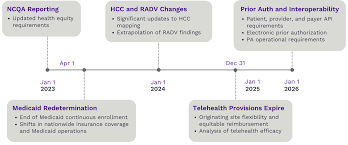Navigating Regulatory Updates: Essential Guidelines for Compliance

Keeping Up with Regulatory Updates: A Guide for Businesses
In today’s rapidly changing business landscape, staying compliant with regulations is crucial for the success and sustainability of any organization. Regulatory updates can impact various aspects of business operations, from financial reporting to data security and environmental practices. To navigate this complex regulatory environment effectively, businesses need to establish robust guidelines for monitoring and implementing regulatory changes.
Why Regulatory Updates Matter
Regulatory updates are issued by government agencies at the federal, state, and local levels to ensure that businesses operate in accordance with laws and standards that protect consumers, employees, and the environment. Failure to comply with these regulations can result in legal penalties, reputational damage, and financial losses.
Guidelines for Managing Regulatory Updates
- Stay Informed: Establish a system for monitoring regulatory changes relevant to your industry. Subscribe to official government publications, industry newsletters, and legal updates to stay informed about new regulations.
- Assess Impact: Evaluate how each regulatory update may affect your business operations, compliance processes, and risk management strategies. Conduct a thorough analysis to understand the implications of the changes.
- Update Policies and Procedures: Revise internal policies, procedures, and training materials to align with the new regulatory requirements. Communicate these updates effectively to employees at all levels of the organization.
- Implement Compliance Controls: Develop controls and mechanisms to ensure ongoing compliance with regulatory updates. Monitor key performance indicators related to compliance and conduct regular audits to identify any gaps or non-compliance issues.
- Engage Legal Counsel: Consult with legal experts specializing in regulatory compliance to seek guidance on interpreting complex regulations and ensuring adherence to legal requirements.
The Benefits of Proactive Compliance
By proactively managing regulatory updates according to established guidelines, businesses can mitigate risks, enhance operational efficiency, build trust with stakeholders, and maintain a competitive edge in the market. Embracing a culture of compliance not only safeguards the organization against potential liabilities but also fosters a reputation for ethical business practices.
In conclusion, staying abreast of regulatory updates and following comprehensive guidelines for compliance is essential for businesses seeking long-term success in a regulated environment. By prioritizing regulatory compliance as a strategic imperative, organizations can navigate challenges effectively while demonstrating their commitment to upholding legal standards and ethical principles.
Staying Compliant: Navigating the Essentials of Regulatory Updates Guidelines for Businesses
- What are regulatory updates guidelines?
- Why are regulatory updates important for businesses?
- How often do regulatory updates occur?
- How can businesses stay informed about regulatory changes?
- What is the impact of non-compliance with regulatory updates?
- How should businesses assess the implications of regulatory changes?
- What steps can businesses take to update their policies and procedures in response to regulatory updates?
- Why is it important to engage legal counsel when dealing with regulatory compliance?
- What are the benefits of proactive compliance with regulatory updates guidelines?
What are regulatory updates guidelines?
Regulatory updates guidelines refer to established principles and procedures that businesses follow to effectively monitor, assess, and implement changes in regulations that impact their operations. These guidelines serve as a roadmap for staying informed about new regulatory requirements, evaluating their implications on business practices, updating internal policies and procedures accordingly, and ensuring ongoing compliance with legal standards. By adhering to regulatory updates guidelines, organizations can navigate the complex regulatory landscape with confidence, mitigate risks associated with non-compliance, and maintain a culture of ethical business conduct.
Why are regulatory updates important for businesses?
Regulatory updates are vital for businesses as they play a crucial role in ensuring compliance with laws and standards that govern various aspects of operations. Staying informed about regulatory changes is essential to avoid legal penalties, reputational damage, and financial losses. By keeping up-to-date with regulatory updates, businesses can adapt their policies and procedures to meet new requirements, enhance risk management strategies, and maintain a competitive edge in the market. Proactively addressing regulatory updates demonstrates a commitment to ethical practices, builds trust with stakeholders, and contributes to long-term sustainability and success in a constantly evolving regulatory landscape.
How often do regulatory updates occur?
Regulatory updates can vary in frequency depending on the industry, jurisdiction, and specific regulations involved. In general, regulatory changes can occur at any time due to shifts in government policies, emerging issues, or advancements in technology. Some industries may experience more frequent updates than others, particularly those that are highly regulated or subject to rapid changes in market conditions. It is essential for businesses to regularly monitor regulatory developments and stay proactive in adapting their compliance practices to ensure adherence to the latest requirements. By staying informed and prepared for regulatory updates, organizations can effectively manage risks and maintain compliance with applicable laws and standards.
How can businesses stay informed about regulatory changes?
To stay informed about regulatory changes, businesses can implement several strategies. Subscribing to official government publications, industry newsletters, and legal updates is essential to receive timely information on new regulations. Additionally, actively participating in industry associations and forums can provide valuable insights into upcoming regulatory developments. Establishing a system for monitoring regulatory changes relevant to the specific industry and regularly conducting compliance assessments can help businesses proactively identify and address any potential impacts of regulatory updates. Engaging with legal counsel specializing in regulatory compliance can also offer expert guidance on interpreting complex regulations and ensuring adherence to legal requirements. By combining these approaches, businesses can effectively navigate the evolving regulatory landscape and maintain compliance with the latest guidelines.
What is the impact of non-compliance with regulatory updates?
Non-compliance with regulatory updates can have significant consequences for businesses across industries. Failure to adhere to updated regulations may result in legal penalties, fines, and sanctions imposed by regulatory authorities. Beyond financial repercussions, non-compliance can damage a company’s reputation, erode customer trust, and lead to potential loss of business opportunities. Moreover, non-compliance with regulatory updates may expose organizations to increased operational risks and vulnerabilities, impacting their long-term sustainability and competitiveness in the market. Therefore, understanding the impact of non-compliance underscores the importance of implementing robust guidelines for monitoring and adhering to regulatory changes to safeguard business interests and ensure compliance with legal requirements.
How should businesses assess the implications of regulatory changes?
When faced with regulatory changes, businesses should assess the implications by conducting a thorough analysis of how these updates may impact various aspects of their operations. This assessment involves evaluating the potential effects on compliance processes, risk management strategies, financial obligations, and overall business practices. By examining the specific requirements outlined in the regulatory changes and considering their alignment with existing policies and procedures, businesses can better understand the implications and take proactive steps to ensure compliance. Engaging with legal counsel or regulatory experts can also provide valuable insights into interpreting complex regulations and implementing necessary adjustments to mitigate risks effectively.
What steps can businesses take to update their policies and procedures in response to regulatory updates?
Businesses can take several proactive steps to update their policies and procedures in response to regulatory updates. Firstly, it is essential to stay informed about the latest regulatory changes by monitoring official government sources and industry publications. Once aware of the updates, businesses should assess the impact on their operations and compliance processes. Subsequently, they can revise internal policies and procedures to align with the new regulations, ensuring that employees are adequately trained on the updated guidelines. Implementing compliance controls, such as regular audits and performance monitoring, can help businesses maintain ongoing adherence to regulatory requirements. Additionally, seeking guidance from legal counsel specializing in regulatory compliance can provide valuable insights into interpreting complex regulations and ensuring full compliance with legal standards. By following these steps diligently, businesses can navigate regulatory updates effectively and uphold a culture of compliance within their organization.
Why is it important to engage legal counsel when dealing with regulatory compliance?
Engaging legal counsel when dealing with regulatory compliance is crucial for businesses to ensure thorough understanding and adherence to complex regulations. Legal experts specializing in regulatory compliance can provide valuable guidance on interpreting the implications of regulatory updates, helping businesses navigate potential legal pitfalls and mitigate risks effectively. By partnering with legal counsel, organizations can proactively address compliance challenges, develop robust strategies for maintaining adherence to regulations, and safeguard their operations from costly penalties and reputational damage. Legal counsel’s expertise in navigating the intricacies of regulatory frameworks can offer businesses a strategic advantage in achieving and sustaining compliance excellence.
What are the benefits of proactive compliance with regulatory updates guidelines?
Proactive compliance with regulatory updates guidelines offers numerous benefits to businesses. By staying ahead of regulatory changes and implementing necessary adjustments in advance, organizations can reduce the risk of non-compliance penalties, legal disputes, and reputational damage. Proactively adhering to regulations also helps companies enhance operational efficiency, build trust with stakeholders, and demonstrate a commitment to ethical business practices. Moreover, by embracing a culture of compliance, businesses can position themselves as responsible corporate citizens and gain a competitive advantage in the marketplace. Ultimately, proactive compliance with regulatory updates guidelines not only ensures legal adherence but also fosters long-term sustainability and success for businesses in today’s complex regulatory landscape.



